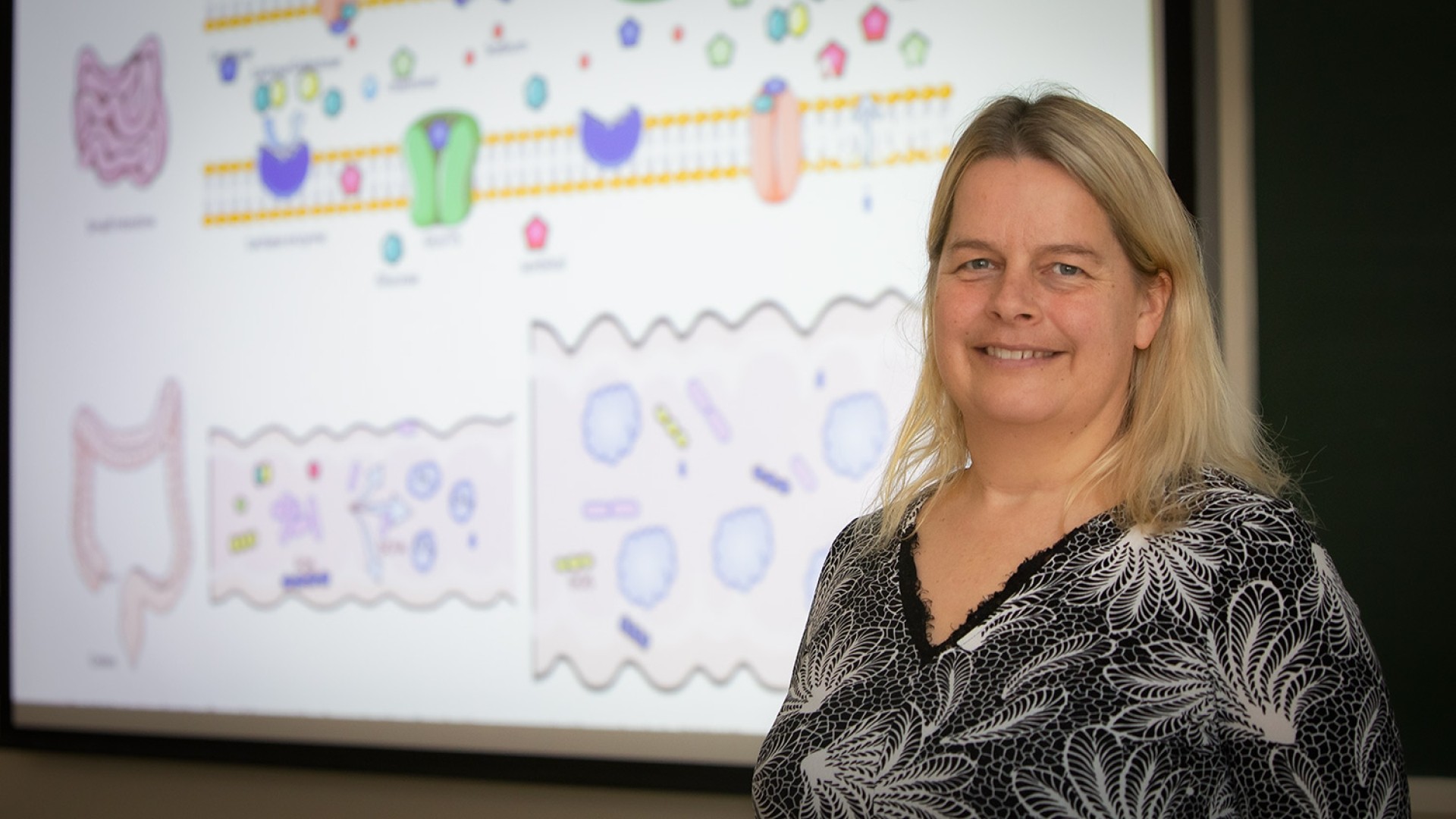
“I very much value that the study is practical and pragmatic and embedded in Nova Scotia Health. It fulfils a value of mine that what I am researching is very practical and will have immediate benefits for the patients.” ~ Dr. Ruth Harvie
Determining if virtual dietetic care is effective in the dietary management of IBS
Meet StFX human nutrition professor Dr. Ruth Harvie
Dr. Ruth Harvie joined the StFX Department of Human Nutrition in 2019, where she teaches clinical nutrition and foodservices courses. Among her research projects, Dr. Harvie, who spent a decade as a clinical dietitian in her native New Zealand before transitioning into academia, is working to determine if e-dietary interventions help people who have irritable bowel syndrome (IBS).
Helping improve the quality of life for people who have irritable bowel syndrome (IBS) is the aim of research work now underway at StFX.
Dr. Ruth Harvie, a StFX human nutrition professor and registered dietitian, is a recent recipient of a Research Nova Scotia New Health Investigator Grant and is working to see whether dietary intervention for IBS, delivered virtually by a dietitian, is effective in treating the condition which impacts many Canadians.
Working with Nova Scotia Health and her mentor, Dr. Jennifer Jones of Dalhousie University, Dr. Harvie is currently evaluating the impact of including virtual dietary education within an electronic irritable bowel syndrome pathway. This research is closely related to other research being undertaken by Drs. Jennifer Jones and Michael Stewart who are developing an electronic pathway for IBS. The electronic pathway they are investigating with Nova Scotia Health would provide guidance in diagnosis and management of IBS. It could generate referrals, recommend tests. “The whole point is to really try to make it easier for primary health care providers to be confident they’re giving optimal services,” Dr. Harvie says.
It's also hoped that the proposed virtual education pathway will provide more equitable access to all.
Along with working to determine the effectiveness of e-dietary interventions, Dr. Harvie is analyzing the cost utility of including either one-on-one virtual dietary education or enrollment in an online group within electronic pathways to assist primary care providers in the diagnosis and management of IBS.
Dr. Harvie says the research is exciting as it may hold practical implications for many people.
“I very much value that the study is practical and pragmatic and embedded in Nova Scotia Health. It fulfils a value of mine that what I am researching is very practical and will have immediate benefits for the patients,” says Dr. Harvie, who spent 10 years as a clinical dietitian in her native New Zealand before returning to school to complete her PhD.
She brings extensive experience working in gastrointestinal diseases, and her current research is very much related to work she did during her master’s project in which she investigated the clinical effectiveness of diet in patients with irritable bowel syndrome.
Dr. Harvie says the idea for the project came from her past clinical experience, from a colleague in New Zealand who had talked about the possibility of enrolling patients into online IBS dietary education.
Diet is known to play a role in IBS symptoms, but not everyone has access to dietetic services.
While Dr. Harvie stresses that dietary interventions certainly aren’t a cure, she says they can help make life more manageable.
“We know the dietary education we’re providing can help with a reduction in system severity,” she says, noting that it’s been shown that one-on-one education can help reduce severity for about 70 per cent of patients.
Dr. Harvie says one of the reasons they’re doing a cost-utility analysis is that with many competing needs and only so much money, they want to help answer the question if this is a good use of Nova Scotia Health financial resources.
“I really like that these are practical questions,” she says.
“It excites me, the practical research, and it excites me that, irrespective of outcome, the participants in the study will get access to dietary intervention.”
Dr. Harvie also has other research projects underway. In one, she focuses on malnutrition, particularly in terms of inadequate intake, especially in people who have difficulties swallowing. She and StFX colleague, human nutrition professor Dr. Marcia English, are developing products with extra protein that would help people with swallowing difficulties, including older adults who are vulnerable to age-related changes and medical conditions.
A desire to help people is one of the reasons that led Dr. Harvie into the field of human nutrition. Working as a health care professional fits with her value system and she was always interested in food as it’s science-based but allows her to work with people.
“It really comes back to those values. I really like to do things that can help people.”
Teaching and research appealed to her as she wanted to contribute to the field’s expertise and knowledge base and to help translate and share that information, teaching students and future dietitians.
“I absolutely love my teaching role, and I try to do innovative stuff,” she says.

